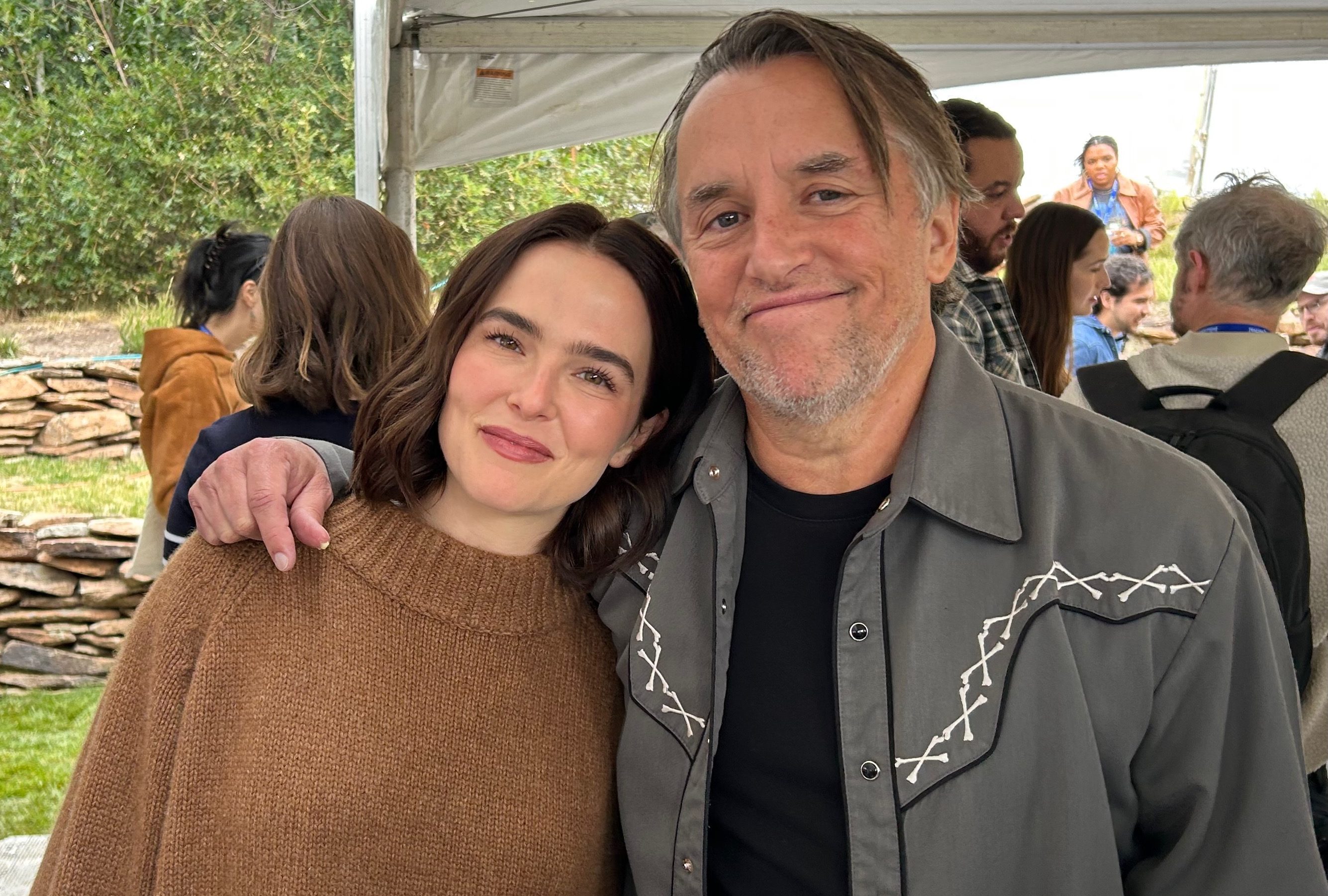
Long before the video diary became the en vogue format of personal expression on YouTube and social media platforms like TikTok, Ross McElwee was America’s preeminent first-person filmmaker. While studying under cinéma vérité pioneers Richard Leacock and Ed Pincus in MIT’s graduate film program, McElwee developed his own style of memoir cinema informed by direct cinema, a Southern literary sensibility ingrained fromhis North Carolina upbringing, and an almost religious belief in elevating the mundane texture of daily life, previously the province of amateur home movies, to a large artistic canvas. His droll voiceover, which warmly blankets and contextualizes his imagery, provides viewers an entrée into an worldview effortlessly engaged with culture, politics, and the smallest details of his private life.
While many of his films feature traditional documentary premises — the lingering effects of the Civil War on the South in “Sherman’s March,” broadcast television’s warped view of reality in “Six O’Clock News,” the complicated legacy of the tobacco industry in “Bright Leaves” — McElwee inevitably deploys them as scaffolding to examine himself and his family. For McElwee, the personal is paramount, and it will either intersect with or supersede any supposedly “professional” requisites whenever it can. His father and siblings, his friends and mentors, they all become recurring characters in his work. McElwee’s innately generous eye keeps his work from devolving into solipsism; he frequently extends his gaze to outsiders to help expand his perspective. For instance, gregarious poet and teacher Charleen Swansea appears in many of his films, playing both captivating subject and a pointed foil. She frequently expresses gentle skepticism towards his longtime friend’s life’s work in casually philosophical terms.
McElwee constantly interrogates his compulsion to film daily life, a recurring theme that becomes more prominent once he begins a family. Part of the joy of watching McElwee’s work over the years not only comes from watching his family grow up, but also seeing how his creative perspective changes in response to his concerns as a late-in-life husband and father. He adapts his working methods and cheerfully embraces his family as co-authors, but his belief in continuous filmmaking eventually clashes with the wishes of his wife and kids, who understandably don’t want their private lives to be grist for the artistic mill. “Turn it off! This is important. This is not art; this is life!” Charleen exclaims to McElwee in “Sherman’s March,” insisting that his camera has become a mechanism of detachment. But this tension between art and life, and McElwee’s insistence in rendering it a Möbius strip, ultimatelydrives his singular artistic practice.
“Remake,” McElwee’s latest accomplished feature, strikes a raw nerve because he makes his family his primary subject for an especially tragic reason. McElwee’s son Adrian, a recurring figure in his father’s work dating back to when his birth wasdocumented in “Time Indefinite” way back in 1993, died in 2016 of an accidental drug overdose following a long struggle with mental health issues. With “Remake,” McElwee pays tribute to his son by tracing their on-camera relationship, incorporating footage he and Adrian filmed separately and together. In his voiceover, McElwee frequently addresses Adrian and eulogizes his memory, but also expresses self-critical ruminations about his part in his son’s death, how his filmmaking may have contributed to his shaky self-image and the growing distance between them.
Pain and heartbreak understandably radiate from McElwee’s voice throughout “Remake,” a deliberately heavy affair that dives headfirst into the director’s lingering remorse. He announces Adrian’s death minutes into the film, so every subsequent image of him, from when he was a happy, photogenic child through his more troubled adolescence and subdued final years, are framed by his absence. “Remake” adopts a non-linear approach similar to fragmented memory, jumping back and forth between the past and more recent present, which Ross compares to film reels being out of order. His commentary across the film, which potently mixes 16mm film and contemporary digital imagery that encompass the multiple eras of Adrian’s life, switches between adoration and regret befitting a father still contending with such a devastating loss.
Save for a few notable exceptions, McElwee has almost always been the main character in his films, but with “Remake,” he appropriately shares focus with his son, whom he paints without judgment as a lovable, flawed human being. “Remake” portrays Adrian as an ambitious, charming young man whose drive was stymied by substance abuse and unmanaged bipolar disorder, but McElwee never lets his son’s setbacks define him in the film. He frequently captures his outgoing personality and sly wit, both as a kid and an adult. Their alternatively affable and tense banter in front of the camera depict a fraught father-son relationship in miniature, but also how self-aware and intelligent Adrian could be even in his lowest moments.
Adrian’s professional goals varied across multiple disciplines — filmmaker of music and skateboard videos, online entrepreneur, brand manager — but they were founded on a love of moving-image work clearly stemming from his father’s influence. At one point, Adrian speaks unfavorably of documentary cinema, claiming he wants to make “real movies” and happily agrees to work within a Hollywood ecosystem that his dad rejected. But he eventually begins filming himself and his friends, like McElwee once did, and even addresses the camera in a similarly intimate fashion. McElwee incorporates Adrian’s own unvarnished filmmaking efforts into “Remake,” some of which were designed to be part of a project on opioid addiction in youth culture. The results are authentic and occasionally upsetting: sometimes it’s fluid first-person snowboarding footage and other times it’s dark scenes of drug use.
Like most of McElwee’s films, “Remake” meanders from his relationship with his son to various other personal and professional threads, which serve as necessary breaks from the film’s central tragedy and meaningful detours on their own. He discusses the painful separation from his wife Marilyn and how it impacted his relationships with Adrian and his daughter Mariah. At one point, McElwee undergoes brain surgery after a doctor discovers a massive tumor that surprisingly caused no physical symptoms. The most prominent digression involves the futile attempts of comedy director Steve Carr, whose credits include “Daddy Day Care” and “Paul Blart: Mall Cop,” to remake McElwee’s most enduring film “Sherman’s March” into a fictional movie. Though initially skeptical of the idea, McElwee agrees to Carr’s proposal and, in typical fashion, plans to document his efforts. This was the initial foundation of “Remake,” hence the title.
As to be expected, a fictional “Sherman’s March” never gets off the ground, but not before going through multiple phases of prolonged development: the movie eventually morphs into an hour-long dramatic series before reaching its final failed state as a half-hour comedy. (The single funniest moment in “Remake” features McElwee, shocked and dismayed, watching a sizzle reel of scenes from “Sherman’s March,” presumably assembled for interested producers, soundtracked to Beck’s “Loser.”) Yet, McElwee uses Hollywood’s fleeting attraction with “Sherman’s March” to reconnect with real-life figures from his 1986 film and restage certain scenes in the present day. A former girlfriend featured in the film remarks to McElwee that it now plays like a version of sense memory for her and a crucial document of a bygone time in her life.
But as much as McElwee wanders away from Adrian in “Remake,” his absence always snaps the film back into place. So much of “Remake” plays like a companion piece to “Time Indefinite,” McElwee’s last film explicitly focused on family and loss. Whereas that film was an optimistic portrait of new beginnings (McElwee‘s engagement and marriage to Marilyn; the birth of Adrian) tinged with a series of unexpected deaths, “Remake” is its explicitly mournful counterpart. On paper, the choice for McElwee to detail his son’s final year in painstaking detail, across interview footage and recorded phone calls, might seem like an exercise in misery. In practice, however, the sheer accumulation of documented material becomes absorbing because it’s the act of a father desperately struggling to hold onto the memory of his son, even in his darkest hour.
Adrian’s death encompasses so many various endings in McElwee’s life, both small and large, including the end of his 24-year-long marriage, the sale of his beloved house, and the slow evaporation of his friend Charleen’s memory. Anyone remotely invested in McElwee’s career will feel nothing short of devastated to watch McElwee interview an elderly Charleen as she struggles to remember her appearances in his work.
Despite being so dependent on McElwee’s personal and professional history, “Remake” plays perfectly well in a vacuum; he constantly incorporates scenes from his previous films as exposition and background information to ensure that everyone will be up to speed. However, “Remake” will certainlyhave greater significance for those familiar with McElwee’s oeuvre since so much of it recontextualizes and fills in gaps from his prior work, particularly his last feature “Photographic Memory,” which partly chronicles McElwee and Adrian’s fracturing relationship in a different stage. “Remake” questions some of McElwee’s filmmaking choices in the previous film, including the unexamined ethical dilemma of a parent filming their child, especially one obviously struggling with mental illness, for the purpose of public exhibition.
McElwee’s bouts of self-doubt about his modus operandi in “Remake” comprise some of the best scenes of his career. When he watches footage from his wedding during a screening of “Time Indefinite” in Poland right around the end of his marriage, he fantasizes about turning off the projector and storming the stage to the film a lie. For such a reflexive filmmaker, McElwee has never appeared so nakedly introspective as to when he’s implicitly questioning the value of his career and future as a filmmaker, going beyond mere pondering about the relationship between camera and subject. While this contemplative approach was likely inspired by Adrian’s death, it also certainly stems from an aging filmmaker looking back on an intertwined, recursive body of work with a new set of eyes.
“Remake” occasionally suffers from occasionally clumsy cross-cutting and some needless repetition in sound and image, but those minor blemishes fade away in the face of its remarkably affecting heights, which capture a father’s palpable love for his son and a filmmaker’s enduring passion for his creative vision in tandem. McElwee has stated that “Remake” was his attempt to hold onto Adrian and also to let him go. He succeeds in that charge, but that tension he describes, of clinging to memory while desiring to relinquish it, defines McElwee’s vision to a tee. His films document the present, but they also preserve the past in amber and point towards an uncertain future. “Remake,” like all of McElwee’s personal cinema, embody the passage of time itself. In other words, it’s the stuff of life.
Grade: A-
“Remake” premiered at the 2025 Venice Film Festival. It is currently seeking U.S. distribution.
Want to stay up to date on IndieWire’s film reviews and critical thoughts? Subscribe here to our newly launched newsletter, In Review by David Ehrlich, in which our Chief Film Critic and Head Reviews Editor rounds up the best new reviews and streaming picks along with some exclusive musings — all only available to subscribers.



